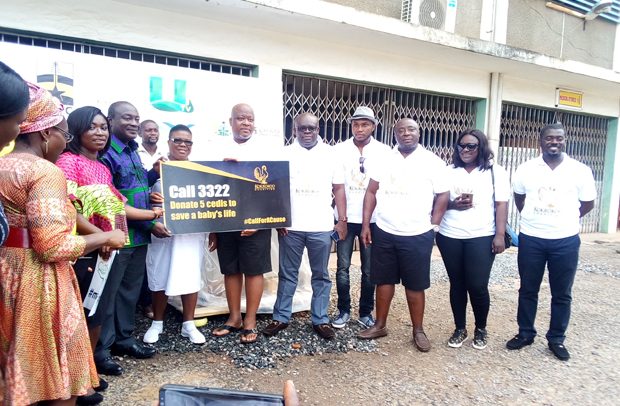Kwame Sefa Kayi (6th right) displaying the donation code with officials from the hospital
Kokrokoo Charities Foundation has installed two new incubators at the Effia-Nkwanta Regional Hospital in Sekondi to help save the lives of premature babies.
The two incubators form part of the ‘Project 100 Incubators’ embarked on by the foundation to help reduce new-born deaths as outlined in the Ghana National Newborn Health Strategy & Action Plan 2014 to 2018.
Already, the foundation has installed and handed over 13 incubators to nine hospitals across seven regions.
The incubators were presented by Kwame Sefa Kayi, an ace radio presenter and founder of the Kokrokoo Charities Foundation.
He mentioned that the project would help increase awareness on neo-natal delivery challenges.
Mr. Sefa Kayi stated that the foundation would mobilise available support for antenatal education and services to ensure access to health for all through targeted interventions.
He added that the project would also focus attention on training of specialist paediatricians and neonatologists in health facilities to help them operate effectively.
“When it comes to child birth, we should have less report or fewer or probably zero reports of infant mortality due to the unavailability of incubators,” he emphasized.
Mr. Sefa Kayi added, “We are just doing our little bit in service to our God and to our country, hoping that this will impact positively on lives.”
“We have so far achieved 20 per cent of our goal and are determined to pursue the remaining 80 percent to fruition by your continued support. Our goal is to drastically reduce preterm deaths,” he mentioned.
Mr. Sefa Kayi indicated that corporate donations, special initiatives and public funding mobilisation with code number ‘3322’ had yielded some positive results, although more needs to be done to achieve the 100 incubators target before 2019.
The Medical Superintendent at Effia-Nkwanta Regional Hospital, Dr. Richard Anthony, thanked the foundation for donating the incubators, which he indicated, would go a long way to save a number of lives of premature babies at the hospital.
From Emmanuel Opoku, Sekondi


